Recipients of the 2025 ZEKE Awards
SDN is proud to announce the First Place and Honorable Mention winners of the 2025 ZEKE Awards.
ZEKE Award for Documentary Photography
SDN awards one photographer the ZEKE Award for Documentary Photography to recognize their success in documentary photography and visual storytelling with an emphasis on themes that affect the global community.
ZEKE Award for Systemic Change
SDN is partnering again with the Foundation for Systemic Change for the fourth year. SDN awards one photographer the ZEKE Award for Systemic Change to recognize their outstanding visual stories documenting systemic changes leading to sustainable solutions to important issues affecting the world today.
The awardees will be exhibited at Photoville in Brooklyn, NY in June and appear in the Spring 2025 issue of ZEKE Magazine.
First Place: ZEKE Award for Documentary Photography
Carlos Folgoso Sueiro
Beyond the Lake
Spain
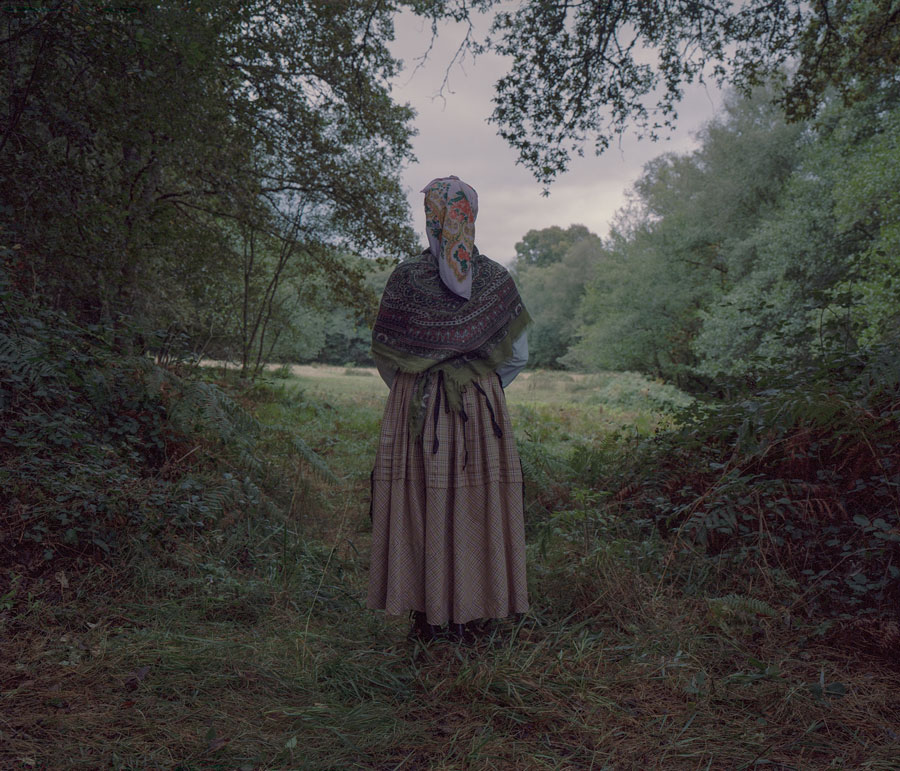
Nestled in the lush landscapes of Galicia, a woman dressed in traditional Galician attire poses before a meadow at the edge of a wooded enclave. The vegetation, a testament to Galicia’s historical abundance of rainfall, unfolds before her. The essence of Galicia’s enduring green legacy, shaped by the perennial rains that have blessed the region, is embodied in the silhouette of this woman, in a connection with nature that characterizes the people of Galicia. Photograph by Carlos Folgoso Sueiro.
Tony brought home nuts, claiming Rosemary gave them to him, though she existed only in his dreams. Adolf and Raúl’s house was burned down by neighbors over land disputes. María, an emigrant, left her son in Galicia. Years after her return, he succumbed to alcoholism, a reflection of the broader struggles faced in rural areas. Sabucedo’s wild horses struggle for space as rural abandonment reduces their lands. The droughts of 2022/23 left 14.6% of Spain in water emergency, exposing critically low reservoirs. The village of Aceredo, submerged by the Lindoso reservoir, has reemerged due to droughts, offering a haunting glimpse into the past. Eucalyptus replanting for industry, including Altri’s proposed textile fiber plant, risks biodiversity, soil health, and water sustainability. The factory’s daily water use of 46 million liters threatens the Ulla River, a lifeline for the region.
These stories stem from Galicia, where reality blends legend. Change driven by climate challenges, depopulation, land abandonment, emigration, and alcoholism threatens the fragile identity of Galicia’s communities. This project sheds light on their struggle to adapt and survive.
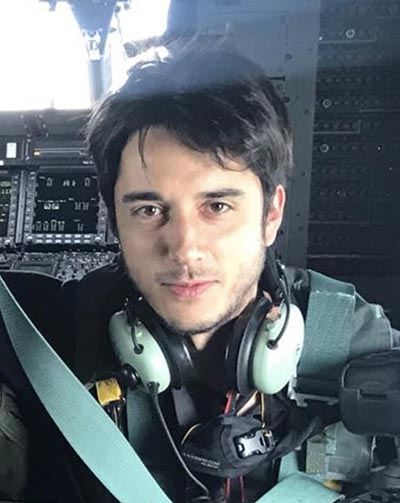 Carlos Folgoso Sueiro is a photographer from Spain who has a Bachelor's Degree in Sociology. His photographic work engages closely with social, geopolitical, and environmental issues, particularly in Russia and his homeland, Galicia, Spain. His interests range from historical and philosophical topics to abstract ideas like the origin of time, gravity, the creation and destiny of the universe, and the deep feelings of human beings. In select works, Carlos investigates, from a metaphorical point of view, the atmosphere and problems of his land: nostalgia, abandonment, social rejection, exclusion, and dualisms such as oppression and domination. Other works stem from long-term documentary projects that explore isolated or self-excluded communities around remote areas of the Russian Far East. For Carlos, what once began as a story about the place itself and the people who lived there, has become a study of his evolution as a photographer. Beyond, his documentary work, Carlos works as a photojournalist covering current events such as the Lampedusa Sea, the migrant crisis in the Mediterranean, the refugee exodus from the Middle East, and the Costa Concordia disaster. His work has been published in several publications including National Geographic, and Vanity Fair. He has also worked closely with leading photographers and photo editors such as Jonas Bendisksen and Alex Webb and also participated in the Eddie Adams Workshop and the New York Times portfolio review.
Carlos Folgoso Sueiro is a photographer from Spain who has a Bachelor's Degree in Sociology. His photographic work engages closely with social, geopolitical, and environmental issues, particularly in Russia and his homeland, Galicia, Spain. His interests range from historical and philosophical topics to abstract ideas like the origin of time, gravity, the creation and destiny of the universe, and the deep feelings of human beings. In select works, Carlos investigates, from a metaphorical point of view, the atmosphere and problems of his land: nostalgia, abandonment, social rejection, exclusion, and dualisms such as oppression and domination. Other works stem from long-term documentary projects that explore isolated or self-excluded communities around remote areas of the Russian Far East. For Carlos, what once began as a story about the place itself and the people who lived there, has become a study of his evolution as a photographer. Beyond, his documentary work, Carlos works as a photojournalist covering current events such as the Lampedusa Sea, the migrant crisis in the Mediterranean, the refugee exodus from the Middle East, and the Costa Concordia disaster. His work has been published in several publications including National Geographic, and Vanity Fair. He has also worked closely with leading photographers and photo editors such as Jonas Bendisksen and Alex Webb and also participated in the Eddie Adams Workshop and the New York Times portfolio review.
First Place: ZEKE Award for Systemic Change
Jan Banning
Healing Wounds: Reconciliation in Post-Genocide Rwanda
Rwanda
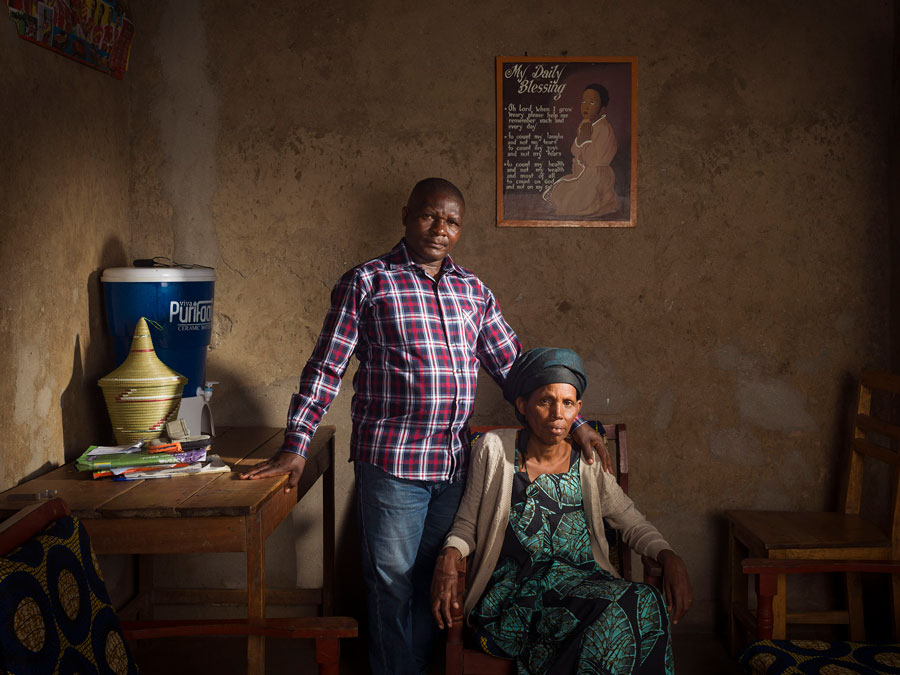
Rose Mukarusagara (60) lost her two eldest children and almost her entire family during the genocide. On April 10, 1994, a group, including Ezechiel Niyibizi (46), attacked her, killed her baby, her sister-in-law, and left Rose severely injured. Her right hand still shows the scars. In 2014, Rose joined CBS Rwanda’s sociotherapy, seeking healing. During the sessions, Ezechiel apologized for killing her baby, and eventually, she forgave him. Photo by Jan Banning.
Thirty years after the 1994 Rwandan genocide, remarkable partnerships have emerged: survivors reconciling with those who killed their loved ones—a profound journey toward healing.
During the genocide, 800,000 people were killed in 100 days, often by neighbors using crude weapons. Survivors bear deep scars, while perpetrators wrestle with guilt. Photographer Jan Banning and writer Dick Wittenberg spent a month meeting pairs of former enemies who reconciled, revealing stories of immense suffering and forgiveness.
Over 20% of Rwandans face trauma, with rates exceeding 50% among survivors. To address this, CBS Rwanda introduced a community-based sociotherapy program in 2005. More than 64,000 participants, supported by 1,000 trained volunteers, engage in sessions blending safety, care, and storytelling. Singing, dancing, and shared narratives foster trust and empathy.
Many perpetrators express remorse, and 80% of groups continue meeting, maintaining transformative bonds and rekindling friendships.While the scars of genocide remain, Rwanda demonstrates that even the most divided societies can begin to heal.
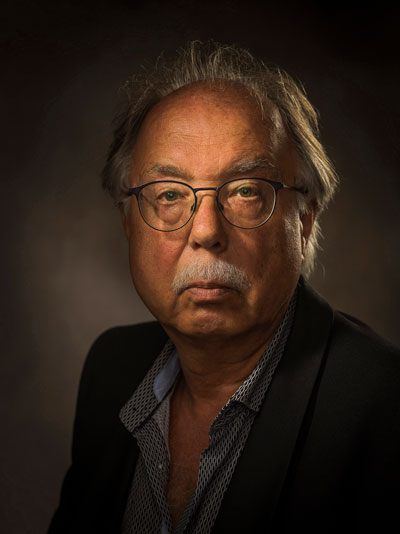 Jan Banning is an independent Dutch photographer based in the Netherlands. Banning was born to parents from the Dutch East Indies (present-day Indonesia) and studied social and economic history. Both his background and academics have strongly influenced his photographic work, whether expressed in his choice of subjects or the historical aspects of his themes. In his photographic work, the socio-political context is generally at the forefront, and he often chooses subjects that are difficult to visualize: state power, the long-term consequences of conflicts, and criminal justice. Sometimes, his work is the result of an approach that relies on sociological or anthropological classification; at other times, it focuses more on the individual psychological impact of major social events. Research plays a significant role in his work as it is the sound intellectual foundation of his projects. Banning frequently conceptualizes his approach and uses a typological method: visual research in which he looks for variations within a tightly repeated form. Banning occasionally describes himself as an ‘artivist,’ not satisfied with merely visualizing themes through documentary work but also striving to bring about change using both his work and his reputation. His work has been showcased in countless collections and exhibitions across the world and has been published in more than a dozen photobooks and by many media outlets.
Jan Banning is an independent Dutch photographer based in the Netherlands. Banning was born to parents from the Dutch East Indies (present-day Indonesia) and studied social and economic history. Both his background and academics have strongly influenced his photographic work, whether expressed in his choice of subjects or the historical aspects of his themes. In his photographic work, the socio-political context is generally at the forefront, and he often chooses subjects that are difficult to visualize: state power, the long-term consequences of conflicts, and criminal justice. Sometimes, his work is the result of an approach that relies on sociological or anthropological classification; at other times, it focuses more on the individual psychological impact of major social events. Research plays a significant role in his work as it is the sound intellectual foundation of his projects. Banning frequently conceptualizes his approach and uses a typological method: visual research in which he looks for variations within a tightly repeated form. Banning occasionally describes himself as an ‘artivist,’ not satisfied with merely visualizing themes through documentary work but also striving to bring about change using both his work and his reputation. His work has been showcased in countless collections and exhibitions across the world and has been published in more than a dozen photobooks and by many media outlets.
Honorable Mentions for Documentary Photography are awarded to:
I Grant You Refuge
View exhibit
Gaza Strip, Palestine
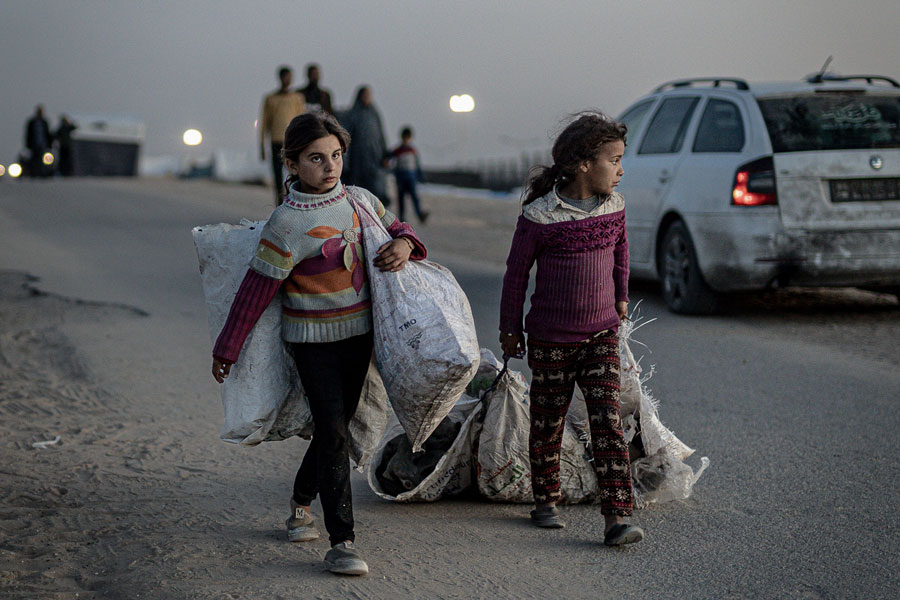
Since dawn, the siblings go every day on a strenuous journey to gather paper for their mother, who relies on it to light the fire at home. These simple moments tell the story of their patience and determination, as they struggle together to provide warmth and food for their family amid harsh living conditions, defying challenges and pain for the sake of their loved ones' survival. Gaza Strip - Rafah, 2023. Photo by Mahdy Zourob
"I Grant You Refuge", is a collective photo exhibition featuring extraordinary images by six photographers from the Gaza Strip, representing the dozens of photojournalists who live and work in the area, eyewitnesses to one of the most devastating conflicts of our time. The exhibition aims to give voice and visibility to the suffering and atrocities that the Palestinian people are enduring, in the deafening silence of the Western media.
The exhibition takes its name from one of the last poems by Palestinian poet, novelist, and teacher, Hiba Abu Nada.
“Being a Palestinian is a story of resilience, pain, and hope intertwined. Every frame captured carries the weight of a nation struggling for justice and peace. Photographers document not just destruction, but also the unyielding spirit of the Palestinian people, the children playing amidst rubble, the silent strength of mothers, and the steadfastness of a community that refuses to be broken. These stories, raw and unfiltered, must be shared to remind the world of the struggles, the sacrifices, and the unwavering hope of every photojournalist, of every Palestinian.” (by Shadi Al-Tabatibi)
Curated by Paolo Patruno
Photo Exhibition Photographers:
Jihad Al-Sharafi
Mahdy Zourob
Mohammed Hajjar
Omar Naaman
Saeed Mohammed Jaras
Shadi Al-Tabatibi
Felipe Fittipaldi
Eustasy
Brazil
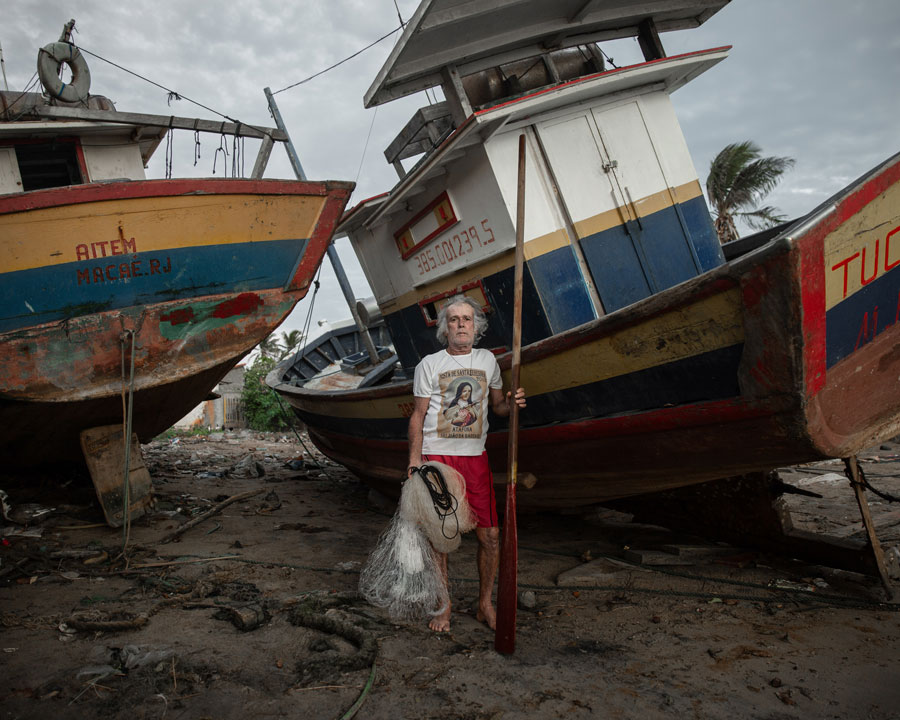
Gervasio Gonçalvez, an environmental immigrant and fisherman, stands beside his boats stored in his backyard. In 2019, erosion caused the right mouth of the Paraíba do Sul Delta to close completely. Now, the left mouth is the only route for fishermen to reach the high seas, sparking serious concerns within the fishing community. Frequent silting often leaves boats stranded during crossings, forcing them to wait for the full moon tide to resume their journeys. Photo by Felipe Fittipaldi.
Atafona, a small town located in the delta of the Paraíba do Sul River, is caught in the grip of environmental change. Over the past few decades, the sea has been gradually submerging the town, forcing hundreds of people to abandon their homes. Its dunes now cover about 500 buildings, including public spaces, residential blocks, a hotel, a gas station, and a church. A combination of factors, including rising sea levels and disastrous human interventions along the river, has made Atafona one of the most significant cases of coastal erosion in Brazil and produced hundreds of environmental immigrants.
Eustasy (2014-2024) is the outcome of a long-term visual exploration of the complex relationship between a community and its environment, characterized by dependency, melancholy, and individuals confronting the relentless degradation of their physical world.
The Intergovernmental Panel on Climate Change reported that sea levels are rising faster than ever, with the rate more than doubling in the past 10 years. According to the World Economic Forum (WEF), over 410 million people could be at risk from rising sea levels by 2100 as a result of the climate crisis.
Laia Ros
Queer Resilience
Kenya
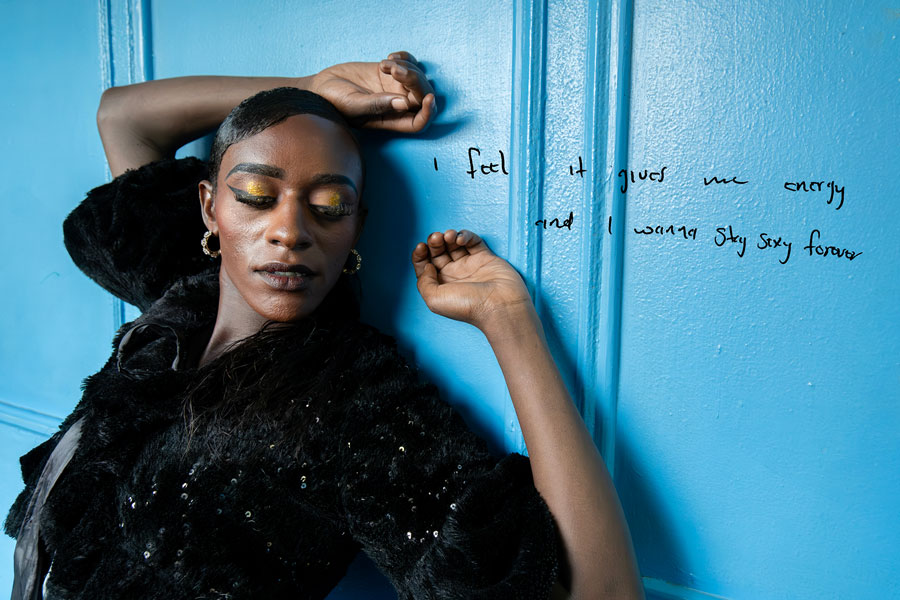
The Ishtar Dolls’ performer Almah poses for the camera in Nairobi, Kenya. For this project, performers were asked to write down what drag meant to them and the text was superimposed on their portraits.
LGBTQIA+ rights are not protected equally around the globe. According to Equaldex, Africa is the continent that ranks the worst in queer equality, due to the very restrictive and discriminatory laws, and societal disapproval, despite the diversity among countries.
In Kenya, a country that ranks 155 in the index of LGBTQIA+ equality out of 197 countries, laws criminalize homosexual acts between consenting adults. However, it’s not illegal to identify as homosexual or to organize for LGBTQIA+ rights, despite the loud complaints of Christian and Muslim groups in the country. This peculiar setup has given activists and members of the community some space to associate and reunite, and to celebrate their identity in safe spaces through demonstrations of queer culture such as ballroom or drag performances.
When working on this issue, several associations were contacted in order to assess that the consent forms were up to their standards. Performers were invited to write down how they feel when they perform, and this was superimposed on their portraits to achieve a collaborative approach.
Valentina Sinis
Were Afghan Women to Unveil Their Tales
Afghanistan
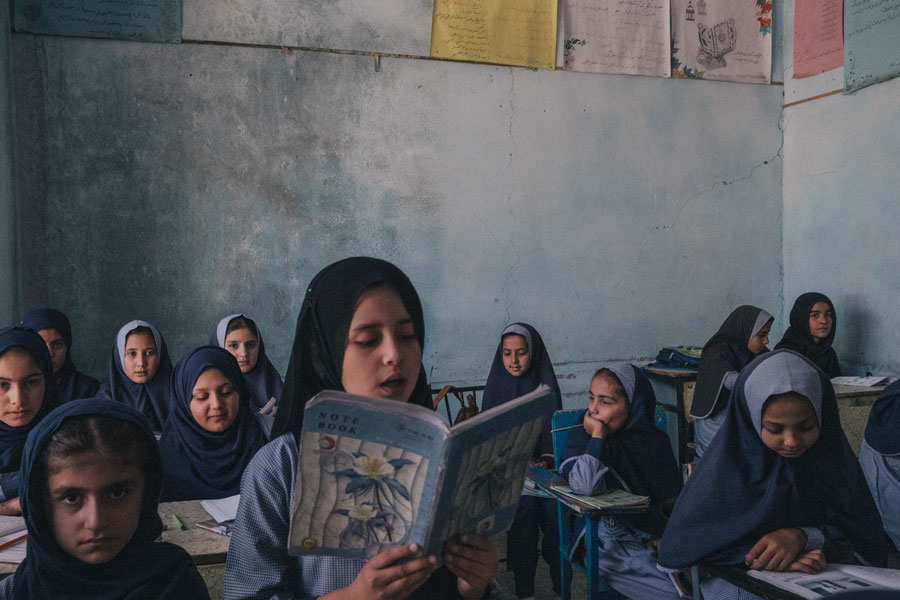
A group of young girls in an elementary school classroom. Since August 2021, the Taliban have methodically stripped women and girls of their access to education in Afghanistan, imposing increasingly severe restrictions. By January 2023, the Taliban intensified their oppressive measures by forbidding girls from taking university entrance exams, effectively reversing any progress that had been made, including instances in some provinces where girls had higher examination participation rates than boys. After completing their education, the majority have no other option but to stay at home and wait for an arranged marriage. Their ability to work outside of the fields of health and education is virtually nonexistent. Photograph by Valentina Sinis.
“Were Afghan Women to Unveil Their Tales” is a project that gives a close and respectful look into Afghan women’s lives, showing what they go through in a difficult reality. Afghanistan today faces many problems, and one of the most serious is the loss of women’s rights and freedom. Since the Taliban took control again, over seventy rules have been made to restrict women’s access to education, work, healthcare, and freedom to move. This harsh environment has greatly worsened the lives of Afghan women, as shown by their own stories. These limits affect women everywhere, from public spaces to their own homes, where they face daily restrictions on movement, opportunities, and even small decisions. Afghan women continue to show incredible strength. Their daily choices like leaving home, running businesses, or organizing in their communities, are brave acts. These actions show a deep determination to hold onto their identity in a society that tries to limit their freedom. Afghan women’s lives are shaped by an inner strength that withstands the pressure of an environment set up to hold them back.
Laurie Smith
One Landscape Divided: Border Wall and Human Crisis
United States and Mexico
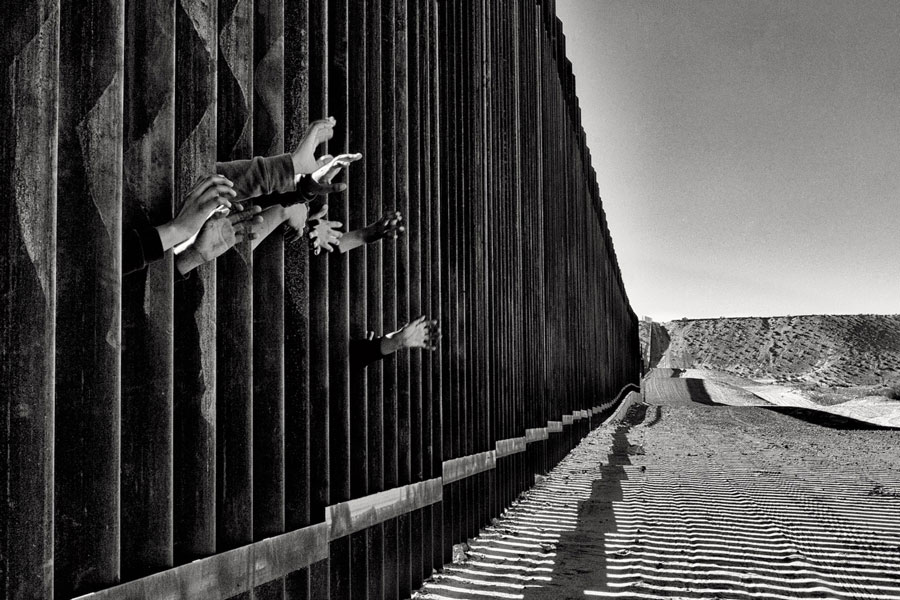
Hands through the wall, Anapra NM, 2019. Photograph by Laurie Smith.
Decades of political gridlock have prevented comprehensive immigration reform in the U.S., with bipartisan efforts stalling again in 2024. The border has become a political pawn, impacting countless lives. Starting in 2016, the Trump administration implemented harsh rhetoric and policies, including the centerpieces of both campaigns: building a new 30-foot steel bollard wall along the entire 2,000 mile stretch of the border, and threatening mass deportations, all intended to deter migrants. Yet, these policies haven't stopped the flow, because people continue to arrive in faith, not fear. (Immediately after taking office in January 2025, the Trump Administration began mass deportations across the U.S.)
Driven by the 2016 building of the wall and the revelation of inhumane migrant detentions and separations, this series of photographs documents the human and environmental cost of these ad hoc policies that will continue until humane and sensible bipartisan immigration reform is enacted into law.
These images, from the El Paso/Juarez sector of the borderlands, invite viewers to experience the stark reality of the border wall, humanize those seeking asylum, inform, and challenge complacency about the crisis at the border.
Honorable Mention for Systemic Change is awarded to:
Simone Tramonte
Net-Zero Transition
Europe
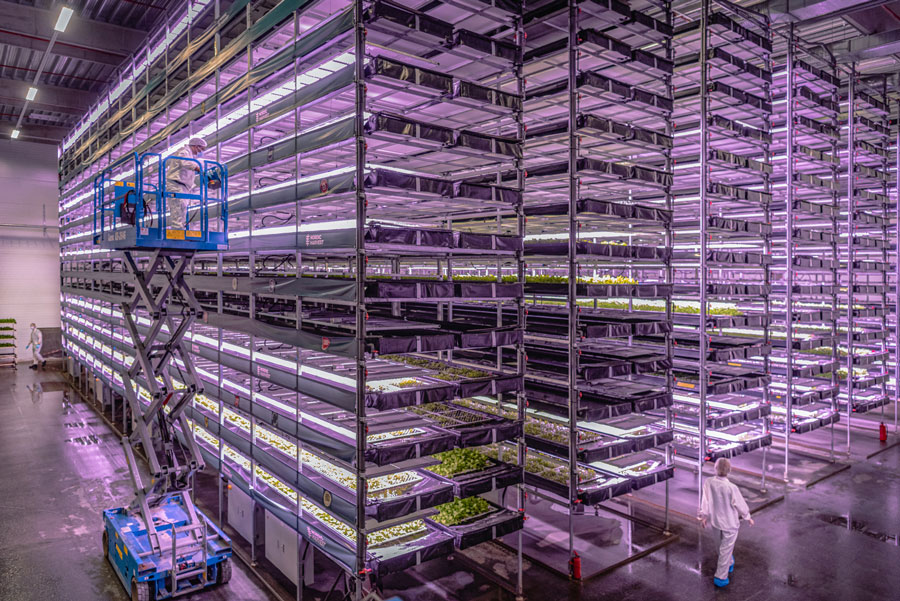
The largest indoor vertical farm in Europe, Nordic Harvest, in Copenhagen. With 14 floors and a full production capacity yield of more than 3,000 kg every day, it is also the most efficient vertical farm in Europe to date. By having full control over the plants’ environment, the indoor farm can deliver herbs and lettuces every day year round, with no need of pesticides, herbicides nor any toxic chemicals. The farm is supplied by wind energy and thanks to the hydroponic-based technology, it uses a very limited amount of water. According to Nordic Harvest, this means up to 250 times less water consumption than on a field and they use 250 times less space than if the plants were cultivated in a field. Vertical farming allows to free up agricultural land and fight deforestation.
Facing the urgent climate crisis, "Net-Zero Transition" documents innovative solutions across Europe aimed at reducing emissions and promoting sustainability. Over the last five years, Simone Tramonte traveled the continent capturing how advanced technologies and sustainable practices are forging a path to a more sustainable future. This project challenges us to rethink our relationship with the environment, highlighting the necessity to integrate humanity with its ecosystem. With the planet warming at unprecedented rates—2023 saw Earth’s average temperature as the warmest in 150 years —immediate action is crucial. The EU aims to cut emissions by at least 55% by 2030 and achieve net-zero by 2050, utilizing methods from geothermal and solar energy to precision agriculture and the circular economy. Through vivid imagery, each photograph narrates a story of technological innovation and significant impact, underscoring the local endeavors that contribute to global environmental goals. "Net-Zero Transition" not only showcases the efforts to meet the European Green Deal but also exemplifies how technology and ecological strategies are merging to foster a fairer, more resilient world.
Jurors
Barbara Ayotte
Communications Director for Social Documentary Network and Editor of ZEKE Magazine. Senior Director of Strategic Communications at GBH.
Greig Cranna
Professional photographer and the founder and director of BRIDGE, a photography gallery in Cambridge, Massachusetts.
Gail Fletcher
Photo Editor at The Guardian US
John Heffernan
More than three decades of experience in non-profit leadership roles on five continents and is currently the president of the Foundation for Systemic Change.
Michael Itkoff
Publisher, creative consultant and cofounded the internationally-celebrated art book publishing house, Daylight.
Maggie Soladay
Senior Photography Editor at the Open Society Foundations in New York.